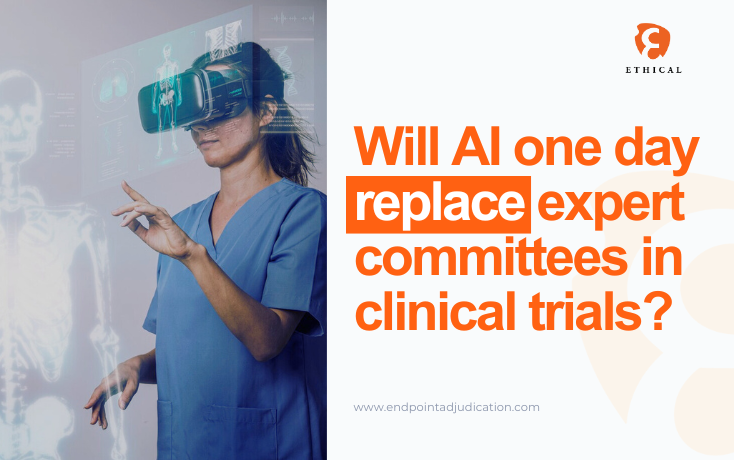With AI being increasingly used in clinical research, including for assessing certain types of endpoints, the future of expert committees in clinical trials is a legitimate question. But do we know how long it could take for AI to acquire sufficient expertise so that humans are no longer needed to assess endpoints? Are we comfortable with the idea that, in the future, the whole medical science could translate into algorithms? Furthermore, could AI become sufficiently trustworthy to assess clinical endpoints in a reliable and traceable manner? Let’s take a few minutes to explore these questions with Ethical’s clinical and IT experts.
- AI is being used more and more in clinical research, including to assess certain types of clinical endpoints. However, in most cases, assessing endpoints still requires the expertise of human medical doctors.
- AI is certainly useful to embrace as a tool to support the clinical endpoint adjudication process, but its “black box” process is difficult to track, making it insufficiently GxP-compliant to be able to replace human medical expertise.
- Additionally, to this day no IT system can claim to have the medical skillset of a human doctor.
- A software platform for clinical endpoint adjudication such as Ethical’s eAdjudication® remains the gold-standard for safe and efficient clinical endpoint operations.
With its ability to very quickly analyze vast amounts of data, AI is transforming the way clinical trials are conducted, and how clinical endpoints are assessed. In drug discovery, for example, AI algorithms can analyze large molecular databases and accelerate the identification of potential drug candidates with specific target profiles. With regards to endpoint adjudication, the responsible use of AI provides clear benefits, some examples are introduced below.
AI for data collection
AI can for example automate the collection and analysis of data from various sources, such as electronic health records, wearable devices, and patient-reported outcomes. This integration of multiple data streams allows for a more comprehensive assessment of clinical endpoints, providing a holistic view of treatment efficacy and patient outcomes.
AI for document search
AI search engines provide a useful tool for individuals involved in endpoint adjudication to find important files or specific information, reducing the time and effort required to find relevant information. This allows users to focus on more critical tasks and improves the overall quality of the clinical endpoint adjudication process.
AI for image-based endpoint assessment
One notable example of efficient AI use in endpoint assessment is cancer research. AI algorithms have been trained to analyze medical images, such as mammograms and pathology slides to detect cancerous lesions. These algorithms can accurately identify abnormalities that may be missed by human observers.
AI for data analysis
AI-driven algorithms can also enhance the accuracy and efficiency of clinical endpoint assessment. With automated data analysis, AI can identify meaningful trends, predict outcomes, and provide real-time feedback. This not only reduces the time and costs associated with manual assessment but also enhances the reliability and validity of the results.
While AI has immense potential in clinical research, there are also limitations that need to be discussed here, especially with respect to clinical endpoint adjudication. As briefly mentioned above, AI can support clinical endpoint assessment, but in a few limited situations only. In most cases, AI cannot replace human medical expertise for clinical endpoint assessment.
The AI “black box” challenge
One major emerging challenge is the interpretability of AI algorithms. Due to their very nature, AI models often function as “black boxes”, making it difficult to know the underlying reasoning behind their assessments, analysis or predictions. This lack of interpretability is a major drawback, as sponsors and regulatory bodies require transparency and accountability in decision-making processes.
Limitations of AI to replace human experts
The philosophical question hovering around the use of Artificial Intelligence instead of medical experts is whether a machine can one day acquire a comprehensive understanding of disease in the same sense that a human being does? The knowledge, expertise, and the subtle sound judgement developed by an expert throughout years of study and connection with patients is unique. To this day, no IT system can claim to have the medical skillset of a human doctor.
AI as a tool, not a virtual expert
In conclusion, it is foreseeable that AI will continue to be used as a tool to support the effectiveness of clinical endpoint adjudication, and that new features of AI will continue to be introduced to assist in quality and effective clinical endpoint adjudication.
A tool is an instrument used to perform repetitive tasks more reliably or to perform certain tasks with better accuracy but does not replace human expertise.
As this article is being written, AI algorithms lacks transparency and accountability, making them poorly suited for GxP compliant clinical endpoint assessment, unless perhaps new committees were set up to check AI consistency… but hang-on, would this really make sense?





